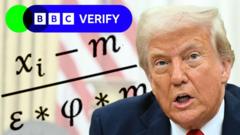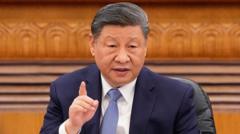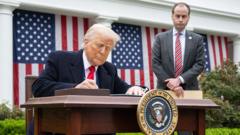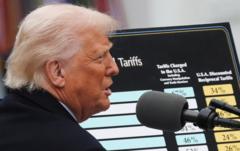President Trump's repeated derogatory remarks about the European Union and his administration’s conflicting actions have fueled fears of a deteriorating relationship with traditional European allies. Analysts are divided between viewing it as indifference or hostility, yet a consensus suggests a shift in America's role as a reliable partner.
Rising Tensions: Trump's Fractured Relationship with European Allies

Rising Tensions: Trump's Fractured Relationship with European Allies
The Trump administration faces scrutiny over its antagonistic stance towards European allies, raising questions about its implications for transatlantic relations.
In a striking assertion during a cabinet meeting, President Trump reiterated his contention that the European Union was designed to undermine the United States economically, stating, "The European Union was formed in order to screw the United States." His remarks follow a pattern established during his first term in office, where he labeled the EU as a "foe" and laid plans for imposing significant tariffs on European imports, including cars.
The Trump administration's approach toward Europe is generating considerable debate about the nature of U.S. foreign policy. Some officials perceive the administration as merely indifferent to its European allies, while others believe there is palpable hostility. The consensus seems to tilt toward a diminishing trustworthiness of the United States as a partner to longstanding allies.
Critics spotlight Trump's overt affinity for Russia, alongside statements reflecting skepticism towards NATO. The administration’s failure to condemn Russia's actions in Ukraine during a recent United Nations vote, where it sided with authoritarian regimes such as Belarus and North Korea, is viewed as a stark deviation from prior U.S. diplomatic practices.
In tandem with Trump, voices like Vice President JD Vance have criticized European democratic movements while advocating for alliances with far-right groups. Meanwhile, high-profile figures like Elon Musk have shown disdain for European leaders and supported extremist parties, contributing to an increasingly complex web of transatlantic relations.
The situation raises essential questions about how these attitudes will reshape the EU-U.S. alliance in the future and whether Trump's administration aims to reshape or dismantle existing European political structures in favor of less centralized governance. The implications of this stance could have far-reaching effects on both trade and international diplomacy, altering the balance of cooperative efforts that have historically defined U.S.-European relations.






















